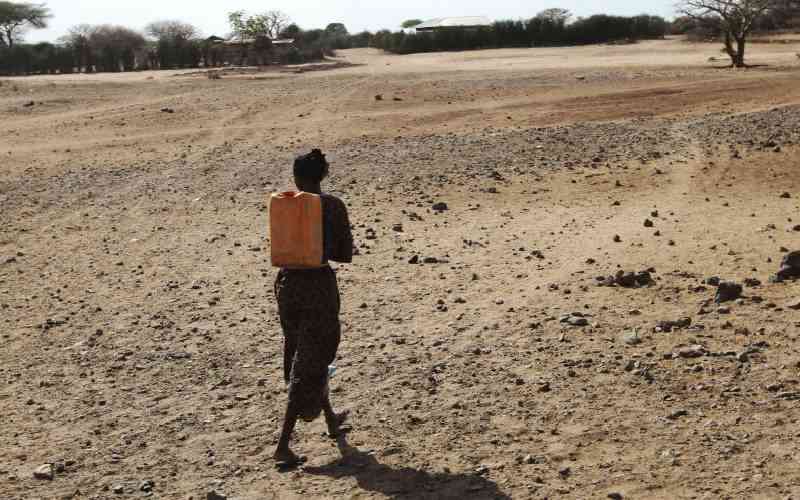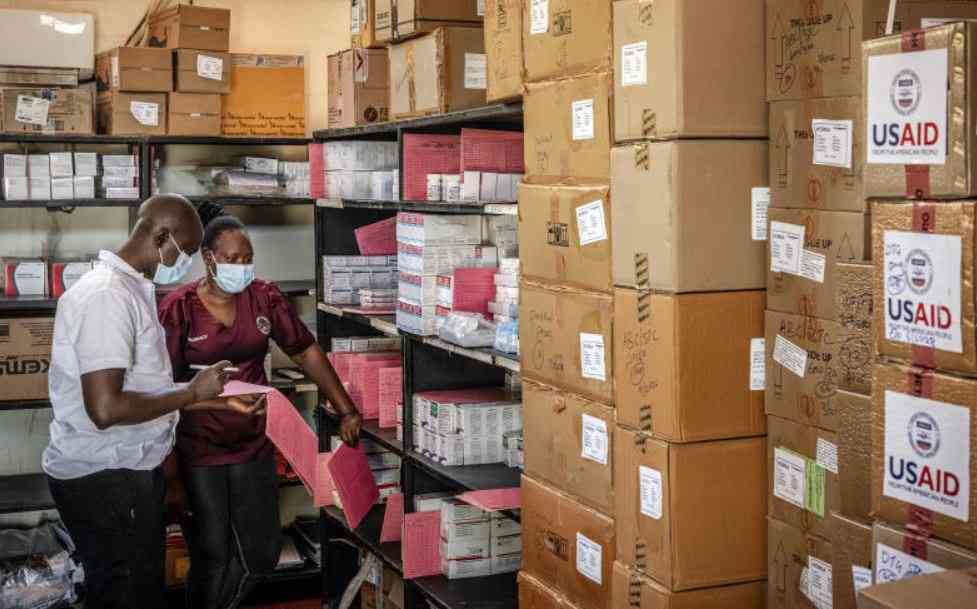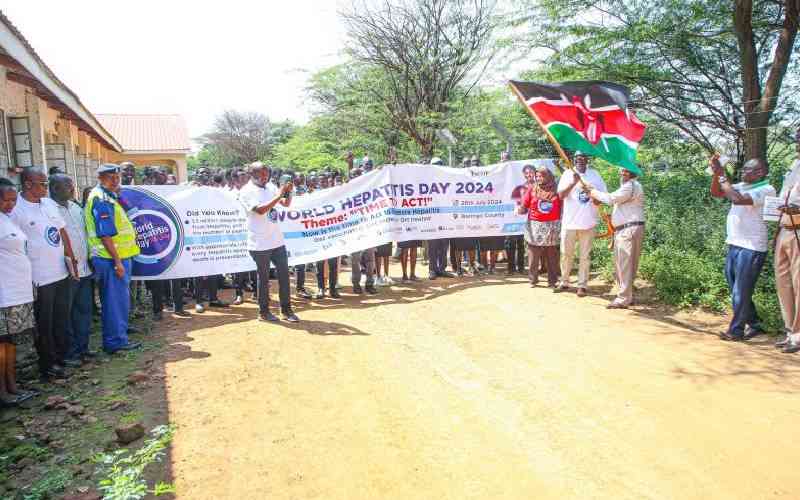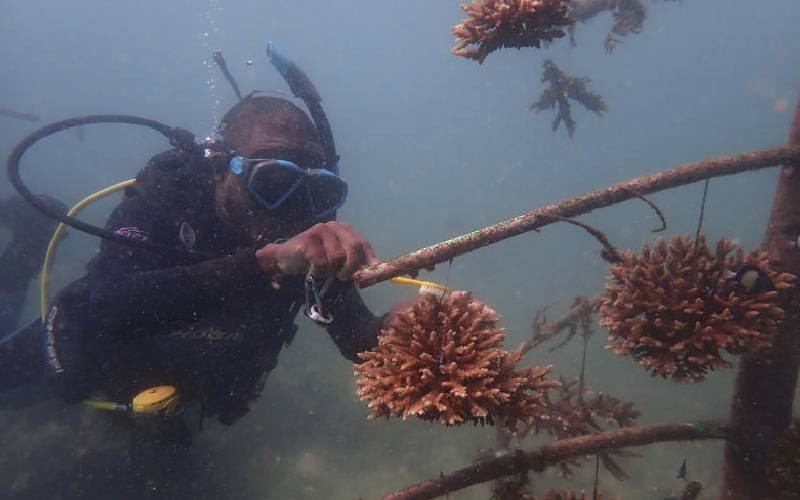
For decades, residents of northern Kenya have endured harsh climatic conditions due to climate change. [File, Standard]
When Africa’s leaders gather in Addis Ababa this week for the Second Africa Climate Summit, the headline theme will be financing. Beneath that, however, lies a sharper demand — linking climate justice with debt reform.
Africa loses five per cent of GDP annually to climate disasters. At the same time, many countries pay more to service debts than to fund health or education. New climate finance, offered mostly as loans, only deepens this trap.
Former Mauritian President Bibi Ameenah Firdaus Gurib-Fakim said: “Debt reform can no longer be separated from climate reality.” She is part of the African Leaders’ Debt Relief Initiative, which has pushed creditors and multilateral institutions to integrate climate risks into lending frameworks.
Her message is gaining traction. Civil society, economists, and negotiators say Africa cannot meet its $3 trillion (Sh390 trillion) climate goals while chained by old debts and new ones.
The paradox runs deep. Africa contributes less than four per cent of global emissions but faces escalating shocks, drought in the Horn, floods in West Africa, cyclones in Mozambique.
The World Resources Institute estimates the continent will need $579 billion (Sh75 trillion) for adaptation between 2020 and 2030. Current flows are just a fraction of that. Worse, they arrive slowly, in complex forms, and dominated by loans.
- NGO hosts international symposium on climate change
Keep Reading
This comes on top of debt burdens that have grown with rising interest rates and inflation. By 2024, more than half of African countries were either in debt distress or at high risk of it. Climate shocks only make repayment harder.
As Gurib-Fakim argued, Africa already provides trillions in free ecosystem services that stabilise the planet. “Africa, with its vast resources, youthful population, and immense growth potential, should be shaping the rules of global finance, not merely reacting to them,” she said.
The Nairobi Declaration in 2023 called for massive renewable investment and industrialisation powered by clean energy. Two years later, that ambition remains strong. Addis will host more than 45 heads of State and deliver the Addis Ababa Declaration on September 10.
But the urgency has shifted. Leaders now stress that scaling renewables, building resilience, and protecting communities cannot happen without changing how the world finances Africa.
Ambassador Ali Mohamed, Kenya’s climate envoy, said: “Our charge is clear to transform ambition into action by scaling capital, unlocking value chains, and forging alliances that anchor Africa’s competitiveness in the global green economy.”
Scaling capital means changing the rules of the game.
Adaptation flows today are five to ten times below Africa’s needs. And most of that is debt. This is why African negotiators are pressing for a financing order that prioritises grants, concessional loans, and instruments that do not pile onto existing burdens.
Dr Richard Muyungi, Chair of the African Group of Negotiators on Climate Change and Special Envoy to the President of Tanzania, warned that Africa is on the frontline of the crisis, with food security, water access, and development already under severe strain.
He said commitments from the Paris Agreement and other diplomacy corridors remain far below what is needed, while adaptation finance is “inadequate, unpredictable, and loan-heavy, worsening debt distress.” They also want creditors to recognise climate vulnerability in debt restructuring talks. The logic is direct: climate shocks increase repayment risk, so they must be factored into frameworks.
Ethiopia’s Planning Minister Fitsum Assefa backed the push: “Unlocking Africa’s potential requires shedding outdated perceptions of Africa as high-risk and instead recognising the continent as central to a stable climate and equitable global economy.”
At COP29 in Baku, developed countries pledged $300 billion annually under the new finance goal. Africa’s negotiators called it insufficient. They argue that $1.3 trillion is needed, with at least $3 trillion required for Africa’s full climate response.
Civil society groups warn that unless wealthy nations deliver real resources in the right form the continent will be forced to choose between climate survival and debt repayment. That is no choice at all.
Ethiopian Prime Minister Abiy Ahmed, hosting the summit, stated: “Africa seeks not charity, but justice; not pity, but partnership.”
The debt-climate link resonates beyond governments. Communities on the frontlines often see little of international pledges because funds are tied up in bureaucracy or debt service.
Take Mozambique. After back-to-back cyclones, it required billions in reconstruction. Yet high debt levels restricted its capacity to respond. Similar stories repeat in Malawi, Zambia, and Ghana.
Analysts say this proves the point: climate finance without debt reform only creates new traps.
The Addis Ababa Declaration is expected to stress justice-centered finance. Observers will watch if it calls explicitly for debt cancellation, concessional finance, and integration of climate risks into multilateral debt frameworks.
It may also push for Africa’s renewable energy plan scaling to 300 GW by 2030 to be financed through innovative tools that avoid new debt.
Mohamed Adow, Power Shift Africa Executive Director urged: “This summit must resolve the paradox of lack in abundance. If ACS2 can renew our commitment to Agenda 2063 and plan for its implementation, it will have exceeded expectations.”
The Addis summit is a moment of reckoning. Either the world recognizes that debt reform is a prerequisite for climate resilience, or Africa’s ambitions will remain aspirations.
For many African leaders, the choice is clear. As Gurib-Fakim said, linking debt justice with climate resilience is not just about Africa.
“Africa’s stability will be a force for good for the entire world.”
That message will echo from Baku to Addis this week and on to Belem for COP30.
 The Standard Group Plc is a multi-media organization with investments in media
platforms spanning newspaper print
operations, television, radio broadcasting, digital and online services. The
Standard Group is recognized as a
leading multi-media house in Kenya with a key influence in matters of national
and international interest.
The Standard Group Plc is a multi-media organization with investments in media
platforms spanning newspaper print
operations, television, radio broadcasting, digital and online services. The
Standard Group is recognized as a
leading multi-media house in Kenya with a key influence in matters of national
and international interest.











